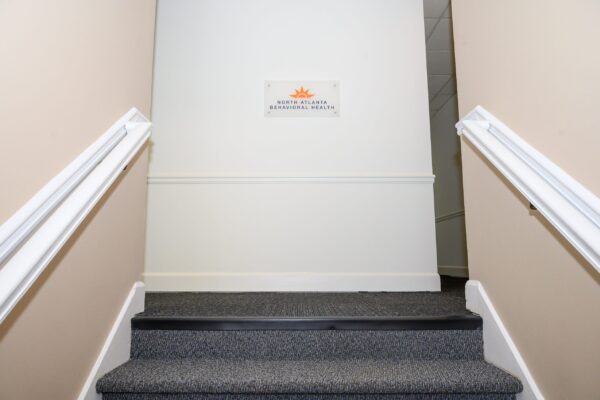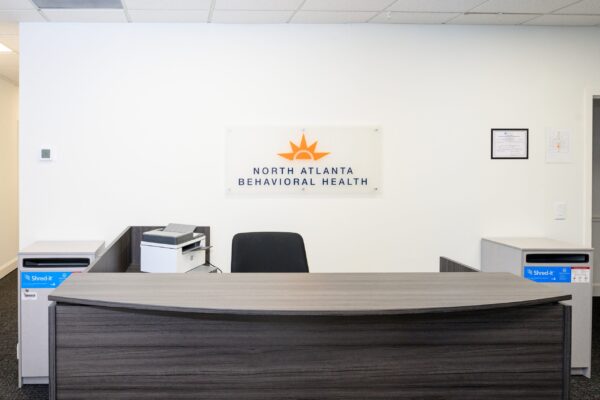When looking for outpatient detox centers in Georgia, help is available at North Atlanta Behavioral Health. Our long-term mental health facilities in Georgia help individuals with substance use disorders in conjunction with mental health disorders find the most appropriate first level of care.
At North Atlanta Behavioral Health, we partner with a number of detox centers in Georgia so that clients can fully go through a full continuum of care and become medically stable before entering into our program.
If you or a loved one are struggling with substance use disorder or dual diagnosis disorders, call us now at 770-230-5699 or verify your insurance.
What is Detox?
Detox (or detoxification) is a process by which people addicted to drugs, alcohol, or other substances rid themselves of those substances and any related toxins from their bodies. The primary purpose of detox is to stop the body’s physical dependence on a substance so that recovery can begin.
Through medical supervision, addiction specialists use medication, nutrition plans, and lifestyle changes to help people transition off addictive substances through detox safely and quickly. Detox focuses solely on ending physical withdrawal before transitioning into longer-term therapies to achieve lasting sobriety.
How Does Detox in Georgia Work?
Drug and alcohol detoxification in Georgia involves a series of steps designed to safely and effectively help individuals withdraw from substances. The process usually includes:
- Assessment: Upon entering a detox program, individuals are assessed by medical professionals to determine their level of substance dependence and any co-occurring mental or physical health conditions. This assessment helps in creating a personalized detox plan.
- Stabilization: This is the core phase of detox. Stabilization involves medically assisting the patient in withdrawing from drugs or alcohol. In many cases, medication may be used to ease withdrawal symptoms and reduce cravings. The aim is to achieve a medically stable, substance-free state.
- Monitoring and Support: Throughout the detox process, patients are closely monitored to manage any withdrawal symptoms and prevent complications. This monitoring is essential for ensuring the patient’s safety and comfort.
- Preparing for Treatment: Detox is usually just the first step in addiction treatment. Post-detox, individuals are often encouraged to engage in further treatment, such as inpatient or outpatient therapy, to address the underlying causes of addiction, mental health disorders, and to learn strategies for maintaining sobriety.
The Side Effects of Detox
The side effects of detox can show up in different ways. Depending on the substance being abused and the degree of use, a patient may experience physical symptoms such as:
- Headaches
- Nausea
- Vomiting
- Diarrhea
- Insomnia
- Excessive Fatigue
- Loss of Appetite
- Sweating
- Shaking or Tremors
Psychological side effects are also possible during detox. These may include heightened levels of anxiety, depression, irritability, and restlessness. It is important to remember that while the detox process usually comes with unpleasant side effects, these will decrease until they disappear completely after the successful completion of the program.
Withdrawal Symptoms and Timelines
The timeline and severity of withdrawal symptoms experienced during detox can vary significantly based on a person’s biology, the type of substance they are addicted to, and other factors. Some general timelines for common substances with associated withdrawal symptoms include:
- Alcohol: Symptoms like anxiety, irritability, and insomnia may start 10-12 hours after last use. Physical tremors usually appear 24-72 hours later.
- Opioids (including prescription painkillers): Sweating, nausea, vomiting, and abdominal pain usually begin 8-24 hours after the last dose. Restlessness and agitation begin 48-72 hours afterward.
- Cocaine: Withdrawal starts one day after discontinuation with intense cravings, fatigue, and weakness. Some people may experience depression that begins in about two days or later.
- Benzodiazepines: Some effects, like irritability, emerge within 12 hours after taking the last dose. Some people can experience heart palpitations between 36 and 72 hours after the last dose.
Regardless of the substance, the withdrawal symptoms will eventually peak. The exact time when symptoms peak can vary among different substances and each individual. Generally speaking, the physical symptoms of withdrawal tend to peak within the first 72-96 hours after stopping the use of a substance.
The psychological symptoms usually intensify in the first week or two into detox. It is essential to remember that once symptoms peak, they will gradually decline until they subside entirely. For some people, it may take several months for all withdrawal effects to subside.
Other Services We Provide
North Atlanta Behavior Health offers a wide range of services to help people overcome their substance use and mental health disorders by providing:
- Medication-Assisted Treatment (MAT): MAT is used to help people overcome drug and alcohol withdrawal symptoms along with counseling or behavioral therapy.
- Psychiatry Services: Mental health services that provide evaluations, diagnosis, treatment, and prevention of psychiatric disturbances through individual, group, or family psychotherapy sessions.
- Family Therapy: A form of therapy that addresses feelings between individuals within a family structure to better understand relationship dynamics and improve communication.
- Brainspotting: A therapy that uses eye movements, sounds, and body awareness to help patients process complex emotions related to traumatic events.
- Red Light Therapy: An alternative healing technique involving exposure to red light frequencies for improving physical wellness.
- Holistic Therapy: Therapeutic approach which incorporates various aspects of psychological, emotional, social, and spiritual well-being into the recovery process.
- Partial Hospitalization Programs (PHPs): Programs designed specifically for those that need a more structured rehab program with the freedom to return home in the evenings.
- Intensive Outpatient Programs (IOPs): Well-structured programs wherein participants receive treatment services during the day several times a week.
- Evening IOPs: Recipients undergo treatment similar to daytime IOPs, but in the evenings when they need to work or have other daytime commitments.
- Treatment For Co-Occurring/Dual Diagnosis Conditions: Addiction and mental health treatment services for treating both conditions simultaneously.

By NABH Staff
Medically Reviewed by
Erika Dalton, LMSW.
Last Updated on March 18, 2024
Get Help Now
Begin Depression Treatment in Atlanta Today
Mental health disorders cannot be treated by treating the symptoms alone. We use holistic and evidence-based methods to treat the entire individual.
Facility Image Gallery
Find Detox in Georgia Today!
Take the first step towards living a healthier and happier life. Contact North Atlanta Behavioral Health today for more information about our personalized and comprehensive detox centers in Georgia. We also help people transition to one of our outpatient rehab programs once their detox is completed to help maintain long-term sobriety.

Treatment Philosophy
North Atlanta Behavioral Health is dedicated to the health and happiness of our clients. We offer personalized treatment plans that put each individual’s needs first.

Meet Our Team
Our multidisciplinary team wants nothing more than for our clients to achieve a lifetime of recovery and sobriety. Let us help you get the most out of treatment.













 I have been to my fair share of mental health programs and this one was extremely small, intimate and every staff member I have ever had contact with has been completely professional, compassionate, and caring.
I have been to my fair share of mental health programs and this one was extremely small, intimate and every staff member I have ever had contact with has been completely professional, compassionate, and caring.










